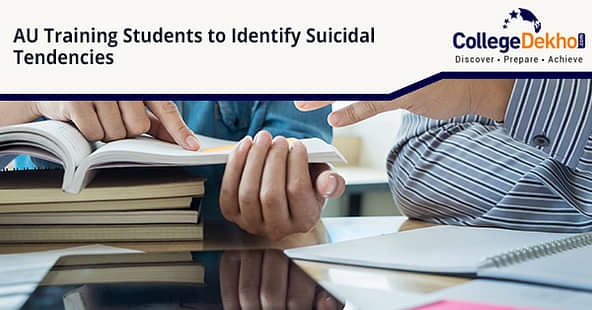The psychology students of Ambedkar University were given training about identifying suicidal tendencies of people. A programme was held to teach the students about suicide prevention.

Ambedkar University, Delhi (AUD) , is training its psychology students to identify suicidal tendencies and also provide psychological first aid to prevent a suicide attempt. The programme of B.A. (honours) in Psychology of Ambedkar University is very popular among students who aspire to make a career as a psychologist and special focus is given on introducing new ways for enhancing the curriculum.
The vice-chancellor of the university, Anu Singh Lather, spoke on the matter and said that it is a major misconception that only mental health professionals like psychiatrists and clinical psychologists are responsible for suicide prevention. She said that the School of Human Studies of the university has been organising several programmes for spreading awareness among its students about suicidal behaviour. Professional skills that are required for identifying the signs of suicide and providing psychological first aid and referral for preventing ‘suicide death’ or ‘suicide attempt’ are also being provided to the students of psychology. A training session was held on 3rd October 2019 as a part of the university’s initiative for the fifth-semester students of Psychology honours at the Karampura campus of the university.
Also Read: Psychology: Eligibility, Skills, Colleges and Future Prospects
The session was on being the “gatekeepers” of the society, a metaphor for the providers of psychological first aid, in the context of suicide prevention. It was conducted jointly by the School of Human Studies of Ambedkar University and the Suicide Prevention Foundation of India (SPFI) of Bangalore. The programme ran for a span of four hours and comprised theory, practical, and role play, through which the students were given training about broadening their sensitivity towards the intriguing human behaviour of suicidal tendency.
Also Read: Top 10 Psychology Colleges in Delhi University and their Estimated Cut-offs
The students were given awareness about how the decision to commit suicide is extremely impulsive and just by being a little sensitive, such mishaps can be prevented from occurring in the immediate neighbourhood. They were provided with training to gauge the verbal, behavioural, and social signs of suicidal intention. The knowledge of the provision of QPR, (Question, Persuade, Refer) which is a technique of psychological first aid to potential suicide victims, was also imparted to the students. They were also empowered with the discretion to make appropriate referrals to mental health professionals like clinical psychologists, psychiatrists or psychiatric social workers.


 Follow us
Follow us













